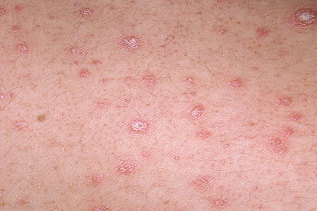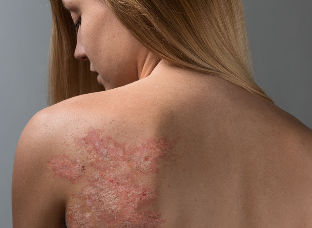
Of psoriasis about 4% of the world's population. He can love at any age from birth to old age, however the majority of Psoriasis "" young. The fact that 70% of patients with Psoriasis develop up to the age of 20 years.
Symptoms of Psoriasis: itching, skin rash, skin desquamation
Linkman: Skin Doctor
Analyses and investigations: biopsy of the skin
Methods of treatment: cryotherapy, PUVA therapy, plasmapheresis
Psoriasis – a chronic non-infectious disease that strikes most often in the Form of skin rashes and Peeling of the skin.
Of psoriasis about 4% of the world's population. He can love at any age from birth to old age, however the majority of Psoriasis "" young. The fact that 70% of patients with Psoriasis develop up to the age of 20 years.
If the skin appeared skin rashes, similar psoriasis – ask your skin doctor. Skin rashes are itchy scaly plates in different sizes. In the process, Plaques Psoriasis can affect the elbows, knees, scalp, or other parts of the body The doctor can make the correct diagnosis and to appoint, depending on its Form, the treatment.
The causes of psoriasis
Psoriasis is an abnormal reaction of the organism to external stimuli, which in some parts of the body, the upper layer of the skin dies a lot faster than normal. If in General, the cycle of division and maturation of skin cells occurs within 3-4 weeks, in the case of psoriasis this process is runs in only 4-5 days.
Currently psoriasis believe hereditary multifactorialnyh disease: disease is based on not one, but a whole complex of reasons, immunological changes, metabolic disorders, accompanying endocrine and neurological disorders. Here, you can say: Psoriasis is a non contagious, and therefore non-contagious disease.
The causes of Psoriasis still not definitively found. There are various theories.
According to one theory, there are two types of Psoriasis:
• Psoriasis type I is called sexually refractions of the immune system are inherited. This Form of Psoriasis affects about 65% of the human, wherein the disease is manifested at the young age of 18 to 25 years.• Psoriasis type II in people older than 40 years. In this type of psoriasis are not inherited and is not associated with breakdowns in the cells by the immune system. But, in contrast to Psoriasis, type I, preferably the skin, Psoriasis, type II is often on the nails and joints.
According to another theory, the cause of psoriasis only the violation of the immunity by a variety of factors: it can be stressful, or infectious diseases, or cold climate, or the wrong diet. For example, found that alcohol can trigger the worsening of psoriasis — this is especially true for beer, sparkling wine, strong alcohol. Consumption of food, the deterioration of vinegar, pepper, chocolate, and also the course of the disease and may cause worsening of psoriasis. According to this theory, Psoriasis is a systemic disease. This means that in the case of serious violations in work of immune system, the process can spread to other organs and tissues, such as the joints. In consequence of psoriatricheskii Arthritis can develop due to lesion of the small joints of the hands and feet.
Symptoms of psoriasis

Symptoms of psoriasis inflamed, scaly patches of red color, accompanied by intense itching. Such spots (Plaques) are more common on the scalp, knees, and elbow joints, lower back, and at the points of the folds of the skin . About a quarter of the patients affects the nails.
Depending on the seasonality of relapses (exacerbations of the disease) distinguish three types of Psoriasis: Winter -, summer -, not determined. Most of the Winter type of Psoriasis.
During an exacerbation of the symptoms of Psoriasis on the hands, the knees, the head and lower back and skin folds of reddish color in the Form of Plaques. Their size varies from a pinhead to large areas of size in the palm of your hand and more.
Rashes usually skin by desquamation and pain itching. The peeling of superficial scales, the you stay the more in depth (therefore the second name of Psoriasis — psoriasis). Sometimes in the affected areas of the skin cracks and suppuration.
For progressive Psoriasis is characteristic of the so-called phenomenon Kebnera: the development of the Plaques in places of injuries or scrape the skin.
About a quarter of the patients affects the nails. This point-shaped wells, and Spotting of the nail plate. In addition, nails can utolzhatsya and crumble.
In the summer, under the influence of sun light in patients with winter form of Psoriasis symptoms subside, and sometimes disappear completely. Sick year old Form of Psoriasis, on the contrary, it is recommended to avoid exposure to the sun because it worsens the course of the disease.
Diagnosis of psoriasis
To Determine Psoriasis Skin Doctor. To do this, you turn to the appearance of lesions on the skin, similar to Psoriasis Plaques of different sizes, red, itchy and reducing a scaly. For further diagnosis, a skin biopsy may require.
Psoriasis Treatment
If the doctor has Psoriasis in the early stages, it is quite possible, you will be assigned to predominantly preventive, not a cure.
In essence, manifestations of the disease, the following methods of treatment of Psoriasis:
• Cryotherapy — method of exposure to cold;• Plasmapheresis - Blood Cleansing;
• Therapy with UV — treatment in the short-term procedures, in a similar way with the visit of the Solarium. For a greater effectiveness of the treatment of Psoriasis this method is often) in combination with the intake of specific medications PUVA therapy.
In no case do not try to self treat Psoriasis with ultraviolet light without recommendations of the doctor. In the case of psoriasis, small doses of UV light, the healing, but higher — on the contrary, can podhlestnut the development of the disease. The same also applies for the sun-baths.
Unfortunately, no one knows how to cure Psoriasis completely, since the body "saves memory" about the disease in the Form of biochemical, immunological and functional changes. Back in the Psoriasis can occur at any time happen, therefore, patients should be with such a diagnosis must be constantly observed, in the case of a dermatologist.

























